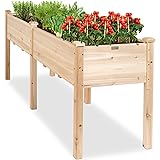Best Choice Products 72x23x30in Raised Garden Bed, Elevated Wood Planter Box Stand for Backyard, Patio, Balcony w/Divider Panel, 6 Legs, 300lb Capacity - Natural
23% Offzizin 2 Pack Galvanized Raised Garden Bed Metal Oval Raised Garden Beds Outdoor Planter Box for Vegetables (12x2x1FT, Silver)
15% OffComposting has become an increasingly popular topic in recent years, and it’s no wonder why. With growing concerns about climate change and sustainability, people are looking for ways to reduce their carbon footprint and live more eco-friendly lives. One of the best ways to do this is through composting.
Introduction to Composting and Sustainable Living
Composting is the process of breaking down organic matter into nutrient-rich soil that can be used to fertilize plants. It’s a natural cycle that has been happening since the beginning of time, but with modern technology and lifestyles, we have disrupted this cycle by sending food waste and other organics to landfills instead of using them to create new life. By composting, we can not only reduce our environmental impact but also create healthier soils and gardens.
The Benefits of Composting for Your Garden and the Environment
There are many benefits to composting, both for your garden and the environment. First and foremost, it reduces greenhouse gas emissions by diverting organic material from landfills where it would decompose without oxygen and release methane, a potent greenhouse gas. Instead, when you compost, you provide an environment rich in oxygen which allows bacteria to break down the materials aerobically, producing carbon dioxide rather than methane. This makes composting one of the most effective ways to combat climate change at home.
In addition to reducing emissions, composting also creates high-quality soil amendments that can improve plant growth and health. The nutrients found in compost help plants grow strong roots, stems, and leaves while also improving soil structure and water retention. And because compost is made locally, there’s no need to transport it long distances or use fossil fuels to produce synthetic fertilizers.
How to Get Started with Composting at Home
Getting started with composting couldn’t be easier! All you need is some space (even if it’s just a balcony), a bin or pile, and some organic materials like food scraps, yard trimmings, and shredded paper. There are several different methods of composting, including vermiculture (using worms) and bokashi (fermentation), but the basic principles remain the same: add brown materials (like dried leaves or newspaper) to balance out the greenness of fresh grass clippings or food scraps, keep the pile moist but not too wet, and turn it regularly to encourage airflow and decomposition.
Tips for Maintaining a Successful Compost Pile
Once you’ve gotten started with composting, here are some tips for maintaining a successful pile:
1. Keep it balanced: Make sure you’re adding equal parts “brown” and “green” materials to your pile to ensure proper moisture levels and aeration.
2. Turn it often: Turning your pile helps to introduce oxygen and distribute moisture evenly throughout the pile. Aim to turn it once every two weeks.
3. Control pests: While composting attracts beneficial insects like ladybugs and bees, it can also draw unwanted critters like rats and flies. To prevent these issues, make sure to cover your pile properly and remove any excess fruit or vegetables that may attract pests.
4. Monitor temperature: Ideally, your compost pile should reach temperatures between 130°F – 160°F to kill off pathogens and speed up decomposition. If your pile is too cool or too hot, adjust accordingly by adding more browns or greens as needed.
Common Misconceptions About Composting Debunked
Despite its many benefits, there are still some common misconceptions about composting that persist. Here are three of the most prevalent myths and why they’re simply untrue:
Myth #1: Composting smells bad. In reality, well-managed compost piles shouldn’t emit any odors beyond a slight earthy scent. If your pile smells sour or rotten, it likely means there’s too much moisture or not enough airflow. Adjust your pile accordingly, and the smell should dissipate.
Myth #2: Composting takes too much time. While starting a compost pile may require some initial effort, once it’s established, it requires very little maintenance. Simply add your organic materials to the pile, turn it occasionally, and let nature take care of the rest.

Myth #3: Composting isn’t worth the effort. Nothing could be further from the truth! Composting provides numerous benefits, including reduced greenhouse gas emissions, improved soil quality, and better plant growth. Plus, it’s a cost-effective way to dispose of household waste and create a valuable resource for your garden.
Conclusion: Why Composting is the Ultimate Solution for Sustainable Living
As our world becomes increasingly concerned with sustainability and reducing our carbon footprint, composting will continue to play a vital role in creating a more eco-friendly future. Whether you’re a homeowner, gardener, or simply someone who wants to live a more sustainable life, composting is the ultimate solution. So start small, learn the basics, and get ready to reap the many benefits of composting today!














































